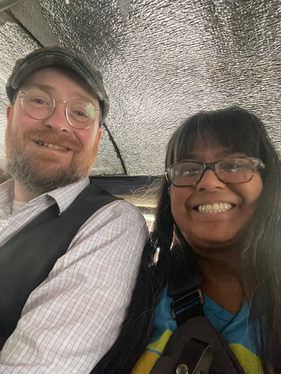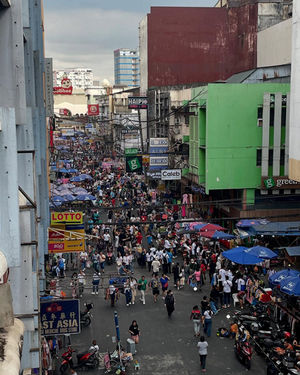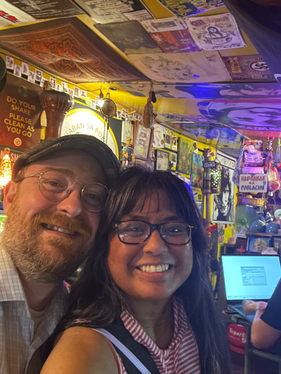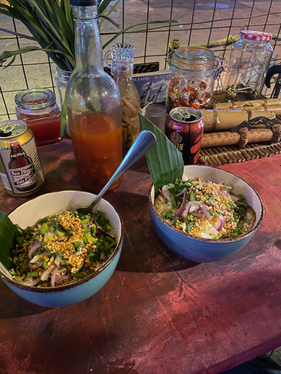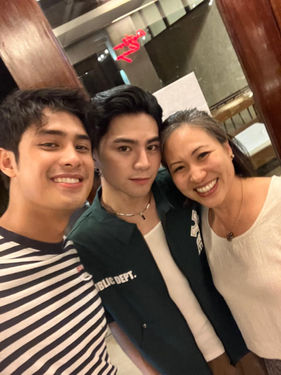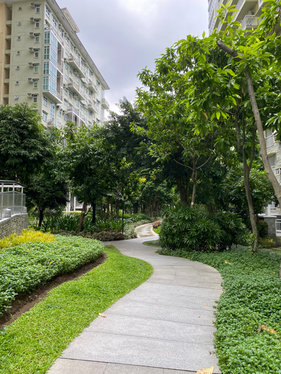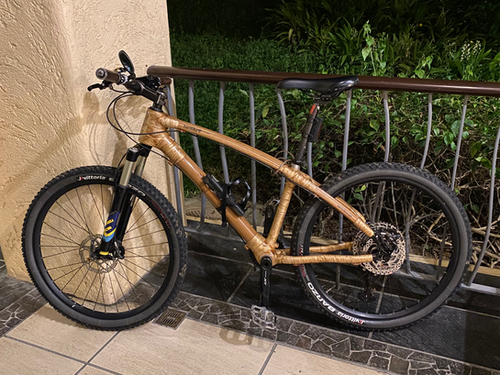09 | Mental Health Insights from Visiting the Philippines in 2025
Published August 1, 2025
One Year Anniversary
In this special one-year anniversary entry of Kasamahan’s Mental Health Blog, we are honored to feature reflections from two valuable members of our Filipino/a/x mental health community, Fredelyn and Cherie, who both separately visited the Philippines in 2025. Their stories bring us full circle, revisiting a heartful theme: what it means for diasporic Filipino/a/x mental health professionals to reconnect with their ancestral land and return with insights that enrich their practices and communities abroad.
Over the past year, this blog has created a space for culturally grounded reflections between the ivory tower, but more stringent work of academia and the bite-sized, but timely information consumed through platforms like Instagram. Our hope for the coming year is to continue promoting the work of more unassuming yet experienced Filipino/a/x mental health professionals who, through our events, have clearly invested in understanding themselves and their practice through a culturally nuanced lens.
This entry begins with Fredelyn’s reflections on her visit to the Philippines earlier this year, followed by an update from Cherie, who returned almost exactly a year after the trip she wrote about in our blog last year.
About Fredelyn
Fredelyn "Fred" Calla, LCPC, ATR-BC, is a counselor and board-certified art therapist in private practice, and a lecturer at prestigious places such as the School of the Art Institute of Chicago. Over the years, she has contributed her clinical expertise to our monthly consultation group—bringing not only a sharp therapeutic lens, but also warmth and vulnerability that has supported colleagues navigating complex clinical circumstances.

What would you like us to know about your professional mental health background and the therapy you provide?

Fredelyn Calla, LCPC, ATR-BC she/her
Owner of Kapwa Art Therapy and Counseling, PLLC
Chicago, IL
I’ve been in the field for almost 20 years; I previously worked as a graphic designer. I am a board-certified art therapist (ATR-BC) and a licensed clinical professional counselor (LCPC) in Illinois and a licensed professional counselor in Wisconsin. I am the sole therapist and owner of Kapwa Art Therapy and Counseling, PLLC, based in Chicago. I offer virtual and in-person individual therapy sessions for adults age 23+ who identify as Black, Indigenous and People of Color (BIPOC). I specialize in Filipino/a/x mental health, as well as those who identify as Asians, Asian Americans, Native Hawaiians and Pacific Islanders.
In addition to my private practice work, I am a part-time lecturer in art therapy at the School of the Art Institute of Chicago and Benedictine University. I also lead support groups for adults living with cancer through Gilda’s Club Chicago.
What would you like to share about your Filipino/a/x background and identity?
I identify as Filipino-American. I am the daughter of Filipino immigrants, making me second generation, being born in Indiana. My Filipina identity has been shaped by a Filipino household where we only spoke English, was taught very little Tagalog, besides trying to decipher who was in trouble when our parents were speaking Tagalog to each other. I grew up with, went to school and church with, and went on vacations with other Filipino/American families in the area. I consider them to have had shaped my racial/cultural identity and related perspectives.
When I was a child, I “hated” most Filipino food, except for chicken and rice. However, when I brought some chicken and rice to school, I was teased and then only ate “hot lunch” at school from then on. I hardly talked about my “Filipino-ness” because I got the impression that white friends didn’t understand it or were bored by it. School friends made fun of my father’s thick accent and my mother’s loud laugh. I experienced shame and anxiety, and I knew nothing of emotional expression, let alone emotional maturity/intelligence until I was in my late ‘20s. I’ve done and continue to do “the deep work” myself in therapy, especially in the last 5 years with a Filipino therapist. I embrace all aspects of my Filipino heritage and culture now, even the aspects that need reform.
Growing up and living in the diaspora, what areas and cultures do you identify with?
The Midwest. I was born and raised in Indiana, went to college in Southwestern Michigan and have lived for almost 30 years in Chicago, Illinois. I have been exposed to mostly white spaces, where I have grown accustomed and feel comfortable. I felt seen when I first discovered and listened to “This Filipino American Life” podcast. When I find myself in mostly Black/brown/mixed spaces and/or Filipino/Asian spaces, I feel much more myself because I don’t have to do as much “editing” or code switching.
What areas did you visit in the Philippines? What are some notable experiences during your visit that you find important to share?
I first visited the Philippines in 1997, when I was 23 years old, with both of my parents. I saw Manila, Candon, Ilocos Sur and Naga City, Bicol, and immediate surrounding areas. My second time visiting the Philippines was late January and early February 2025. I was there with my mother, my sister, and my partner and we stayed in and visited only Manila.
At first, I was struck by poverty. Of course, I’ve always known that extreme poverty exists in the Philippines, but to have walked by, witnessed and been among such, all the while knowing what I was raised with, was given and have worked for in the United States, continued to strike me with sadness, awe, helplessness and hopelessness. Within a couple of days, the almost jarring mix of classes, from the extremely poor to the opulent rich, became “normalized” when we went from tourist attractions, like the malls and Rizal Park, to local establishments, like the malls, standalone restaurants and vendors on motorcycles.
My favorite parts were eating, of course, buying really cheap San Miguel bottles, meeting a punk-rocker-turned-pancit-chef whose videos my partner saw on YouTube, making up our own fried chicken taste tests, going thrifting, making friends with hotel employees and spending time with relatives.
Before the trip, I was also afraid that my “American-ness” could be seen from a mile away and that my sister and I would be judged harshly for it. I emotionally prepared myself to be criticized for the way my body looks and the way I struggle with pronouncing words and names in Tagalog. However, I found I wasn’t. The kindness and pride of Pinoys was overwhelming. The experience of seeing so many people around me who look like me was also overwhelming, fulfilling, restorative and right. I was home, but it was not my home.
Regarding mental health and mental wellness, what are positive and negative factors where you visited that you are able to identify?
Before I visited the Philippines this time around, I did not think there was much cultural emphasis on mental health. I might have assumed mental wellness was a “thing,” due to TikTok trends and American popularity of yoga, meditation, and massage therapy, but not mental health in all its forms helping people work through stress, anxiety, mood disorders and the effects of trauma, like “we” do stateside.
I learned from a relative living in Manila that working on one’s mental health is actually a thing and I was truly relieved. Of course, I’m not “relieved” that Filipinos have to live through such hardship that they feel they need outside help, but I’m thankful it’s available. I’m sure for some, access is not easy and I hope that is being rectified.
Did you notice any differences and similarities in mental healthcare and therapy where you visited in contrast to where you are based?
I am based in the third largest US city, where there are two nationally known art therapy graduate programs. Here, art therapy as a mental health discipline and field is well known, especially in the helping professions. In stark contrast, I gathered the impression that art therapy is not known or heard of as much in Manila and/or the rest of the Philippines. In the same vein, creativity in all its forms is alive and well and Filipinos embody it. That being said, I believe that if a Filipino living in the Philippines does not have systemic and/or financial access to therapy, they will “work through” whatever they need through artmaking, singing, dancing, playing, writing, acting and witnessing.
Caring for others and the community and demanding social justice for all seemed to be embedded heavily in the culture, especially in Manila, and I deeply appreciate that.
What is the impact from your insights with your visit on you and your work so far?
I feel more connected to the culture and most importantly, to some of my relatives. That stronger sense of kinship, the kapwa, ties me closer to my work with my current and future Filipino/a/x clients. That is part of the reason why I chose Kapwa for my practice name. I feel I have a better grasp on the experiences that my Filipino/a/x immigrant clients share. I feel more secure in what I offer my Filipino/a/x and Asian clients and I hope I can continue to improve upon my work.
Do you have anything else that you would like to share?
I’m already planning my next trip back and I really can’t wait. I couldn’t wait to go back once we left. As I’ve said, it is home, but it is not my home. I’ve always had certain parts of “home,” but I’m just now picking up and storing a lot more pieces. More loss than souvenirs, but I will always wish for more.
About Cherie
Alongside Fredelyn’s visit to the Philippines this year, Kasamahan also learned that Cherie B. Concepcion, LMFT, returned to the Philippines in 2025—almost exactly a year after her 2024 visit, which she reflected on in our first ever blog entry.

Welcome back, Cherie! What are some updates you would like us to know about you and your work?

Cherie B. Concepcion, LMFT she/her/siya
IAYT Certified Yoga Therapist and NARM Therapist
North County San Diego, CA
I continue to provide somatically oriented, embodied trauma therapy to individuals and couples. I also provide meditation classes and courses online, which continues to be a work in progress. I am EMDR trained, an IAYT certified yoga therapist, and a certified NARM therapist. I specialize in developmental/relationship trauma.
Though I was born in Los Angeles, CA I feel I was raised between two worlds – the Philippines and the United States. I spent nearly every summer in the Philippines as a child with my Lola in Greenhills, Quezon City. Even in my teens and twenties, I would visit every few years to see my Titas, Titos, and their young children. My parents were only 19 when they married and left for the States despite what their parents wanted.
I identify as a 1.5 generation Filipina-Chinese-American because I’ve spent so much time in the Philippines. My Lola served during WW2 alongside American soldiers to rid the Philippines of Japanese occupation, but yearned to rebuild her country, her homeland, and heal after the war. So, she stayed and built a small manufacturing family business but visited the States frequently as she and my Lolo held a considerable amount of appreciation and admiration for American medicine and technology. My Pohpoh and Kungkung (my Chinese grandparents) also built a business in the Philippines and held the same respect for American things.
In LA, I grew up in a place and time where gang violence, racism, and drugs were a significant problem. Having to navigate my own local wars forced me to dig deep into who I was and what defines me as a person.
Frankness, industriousness, independence, critical thinking, and desire for equality are things I learned here in American institutions and ways of living which contributes to my identity of being an American female. The warmth, gregariousness, love of food, and community I’ve always known from Filipinos makes me Filipina. My love for tea, integrative approaches to medicine, and odd smelling healthy soups, I attribute to my Chinese side of the family.
I am also a military spouse and have proudly served American service members and their families as a counselor and yoga therapist for 10 years helping them heal from the difficulties that military work and service entails.
Identity continues to be such a complex, multifaceted, and layered thing. It really feels like a journey sometimes.
What areas did you visit in the Philippines in 2025? What are some notable experiences during your visit that you find important to share?
Whenever I visit the Philippines, it is always to see my family. This year, another one of my younger cousins got married in Our Lady of Lourdes Parish Church in Tagaytay City, Cavite. I stayed nearby in Silang, with a few overnights in Makati with my cousins who live in BGC. As usual, there was a lot of eating and talking.
One unexpected thing happened: I met and sang with an Idol Philippines contestant from 2019 and a local Gen Z Filipino actor.
Do you have similar or new insights on mental health and mental wellness between your visits from 2024 and 2025?
I continue to have curiosity surrounding the relationship between kapwa and meditation. I also entertain the idea of moving back to the Philippines without committing to do so. I did have some inspiring conversations with relatives who are working in education, and are actively teaching curriculums to promote embodied wellness and self-governance in under-served communities in the Philippines. My relatives and I got to know each other's work and dreamed up some ideas to collaborate that may or may not come into fruition.
I've learned firsthand and through other Kasamahan workshops this past year, that providing mental health care in the Philippines looks very different than how we practice mental health here in the States. Perhaps it looks more like community mental health? I am unsure since I am not trained in that specialty of mental health.
I am also holding the possibility that what practicing mental health looks like in the Philippines largely depends on the returning Fil-Am (balikbayan) clinician's connections and resources back in the Philippines. Here in the States there is significant occupational opportunity and autonomy that is embedded in the infrastructures and social services available.
For US-based clinicians, there is a large buffet of private-practice building platforms and services. Also, there are FREE small business services that are provided by local Small Business Administration (SBA) chapters that are federally funded, for anyone wanting to start, or has started a small business here in the US. Local chapters are found at your local chamber of commerce.
In the Philippines, these services are not so readily available. Based on conversations I had, sustainable funding for social services and projects are largely from NGOs (Nongovernmental Organizations) or foreign investment. Additionally, there are no known resources in the Philippines that makes starting a business or private practice straight forward.
As I contemplate these complexities and differences, I am aware of the possibility that I am holding an idea that might be an illusion or fantasy. Perhaps my desire to move back to the Philippines is based on a dream, a promise, dare I say a delusion - the same promise, dream, or delusion that motivated my parents and so many other Filipinos, to immigrate to the United States.
Would my life there actually be better? Would the longing disappear? What would I be hoping for from such a move? Would the rest of my family be okay uprooting their lives here in the States to live in a country they do not call home?
Do you notice a similar or new impact with this year's visit compared to last year on you and your work?
This year, during and after my trip, I found myself reflecting on decolonization and the reclaiming of Philippine culture, heritage, indigenous practices, healing, and technology. I continue to reflect on colonial mentality and the contrasting movements here in the States to decolonize ourselves and the movements in the Philippines to decolonize from outside influences. These social/psychological movements appear to be so different in each country. Most notably, they feel different.
Here in the States, there seems to be an undercurrent of frustration, perhaps anger, which makes sense since BIPOC communities here in the US have experienced and continue to experience injustice, racism, marginalization, and oppressive systems. Here in the States, there is also an intellectual effort to understand the process and history of colonial mentality and the psychological and behavioral impacts of colonial mentality.
In the Philippines, the move to decolonize from my limited perspective, seems to be less intellectual and less aggressive. There is a predominant feeling of 'let's figure this out together' - a cooperative approach to solving the issue of self-governance and independence. (Could this be Kapwa in action?) I see the movement to decolonize in the Philippines show up largely in commerce (locally produced goods), education programs, and farming programs. For example, I met someone who only rides bamboo bicycles that are handcrafted in the Philippines. I also learned you can order one and have it shipped almost anywhere in the world! How cool is that!
However, my perspective is a limited one and a privileged one. Perhaps my perspective is skewed towards a more romanticized view as has been described of Katrin de Guia's characterization of Kapwa (2005) and Pilipino cultural values.
How these observations and reflections impact my work will continue to reveal themselves to me over time. It certainly widens my tolerance for difference and unknowns. It expands my willingness to be curious and learn, while also providing me a unique lens through direct experience of being in the Philippines, albeit through a limited, privileged view.
Do you have anything else that you would like to share?
This visit also continues to highlight the feeling of being of two worlds and my own migratory grief - feelings of loss and separation from one culture or another (American vs Philippine).
As I embrace my personal feelings and experience, I rediscover my Self, my sankalpa, all the tools I have learned, and then make choices from there.
I hope that my personal work helps to inspire, support, and motivate others to do the same. My hope is to help others discover or rediscover what their inner truths are, and what choices are available to them so that they may live congruently with their deepest sense of heart and wellbeing.
This entry was edited and published by Eliza Jade Brown, LCSW-S
---
For any additional information about them and their work, you may reach out directly to Fredelyn at fredelyn@kapwaarttherapyandcounseling.com and Cherie at cherielmft@gmail.com
Licensed Filipino/a/x mental health professionals may also connect and share space with Fredelyn and Cherie in Kasamahan's Monthly Consultation Group.


